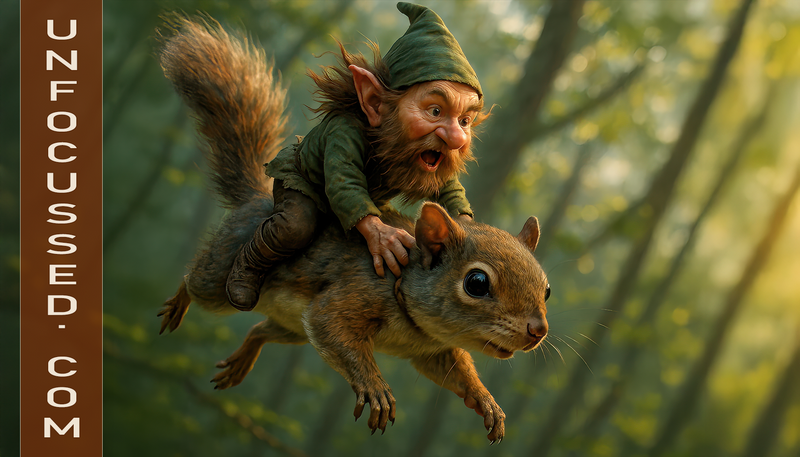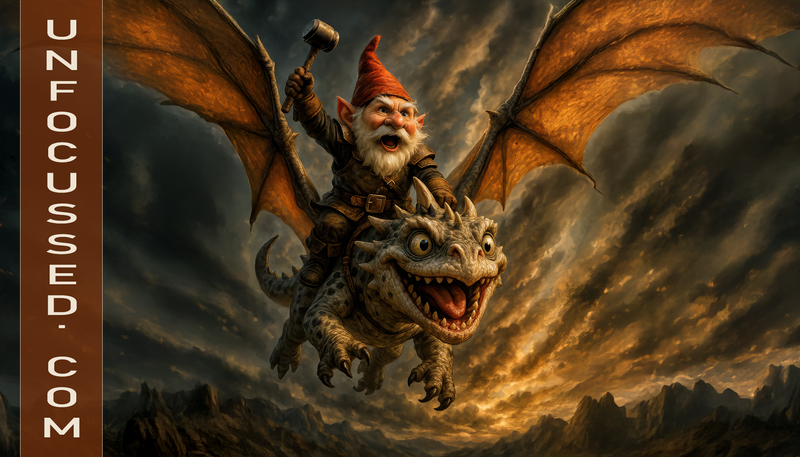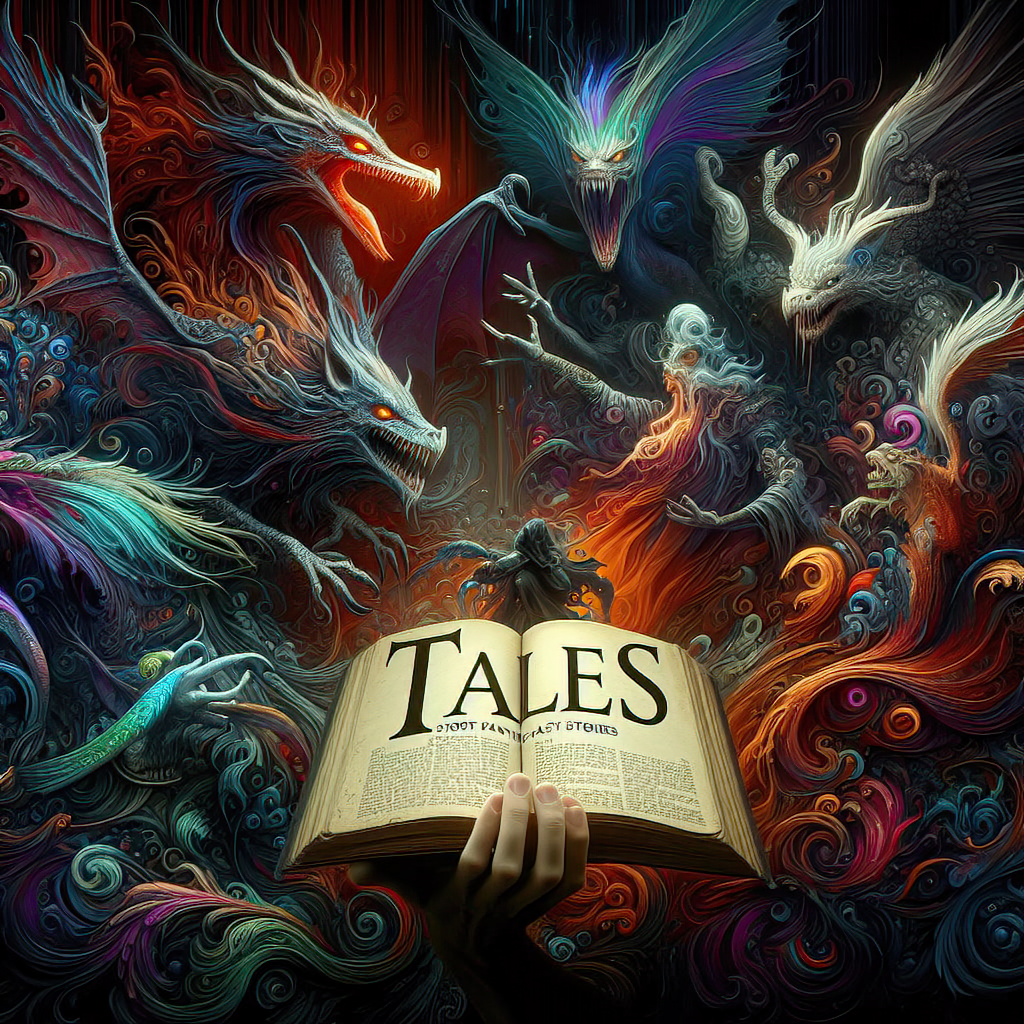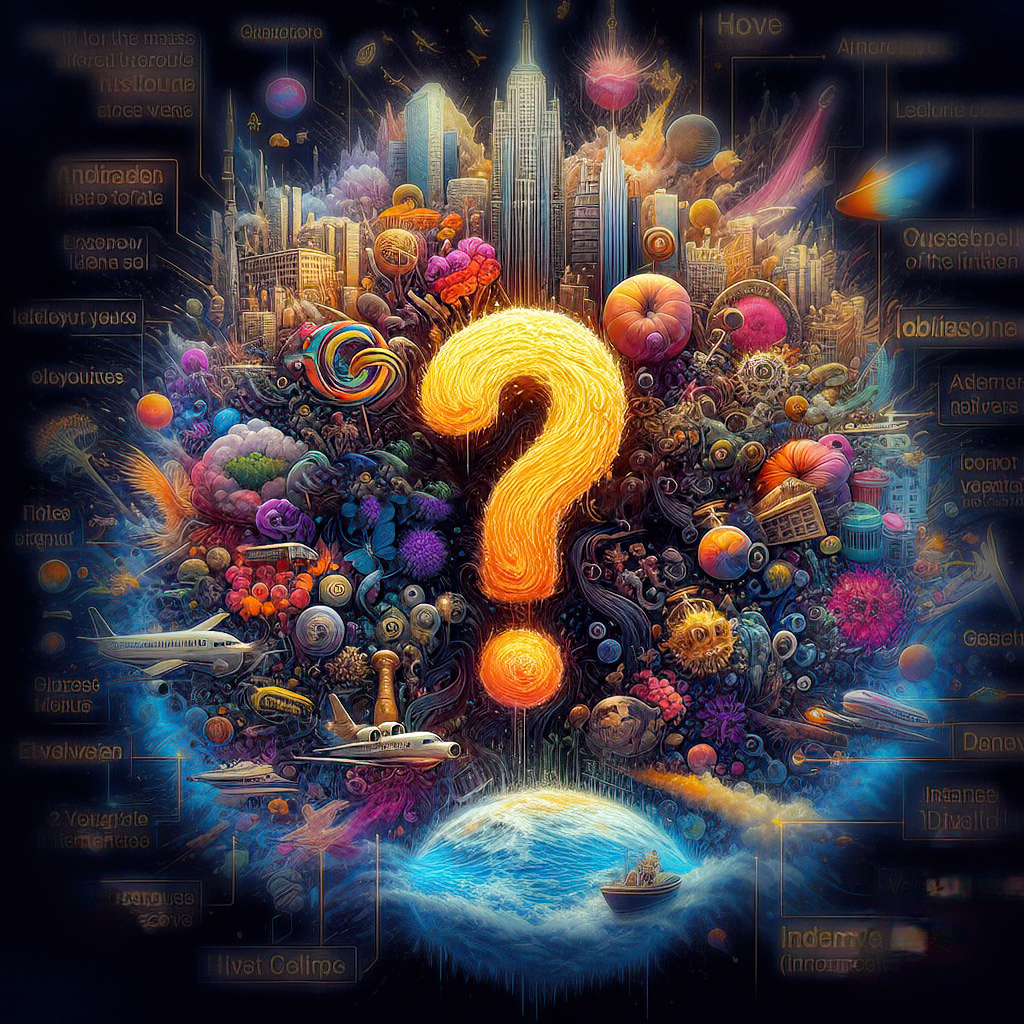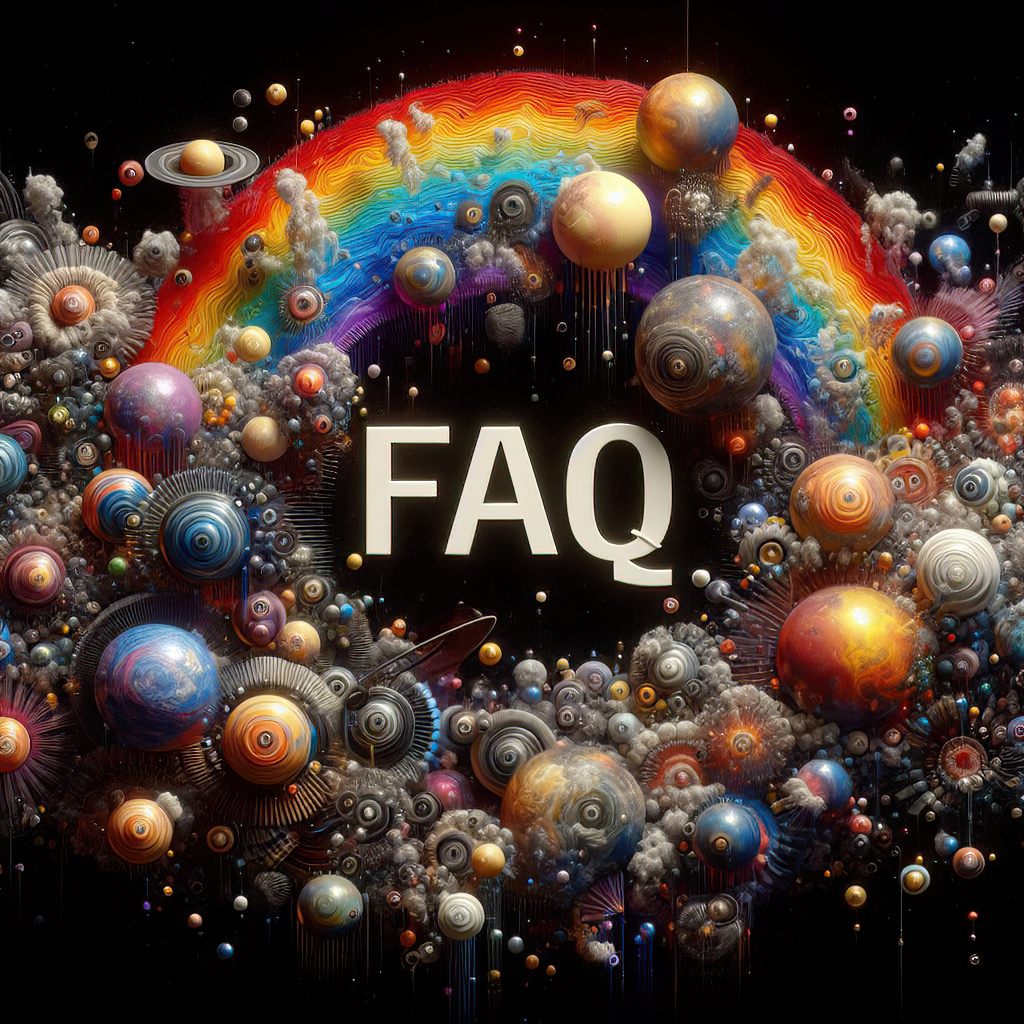
by Bill Tiepelman
The Iron Jester of the North
Ale, Axe, and Absolutely No Quiet They said you could hear him coming before you saw him — a deep, booming laugh that rolled through Frostvik’s frozen streets like thunder over empty kegs. When he finally appeared, shoulders broad as barrels and beard brighter than a smithy’s fire, the market crowd parted like bad soup. His armor clanked, his axe gleamed, and his grin promised entertainment of the regrettable sort. “Ale!” he bellowed. “And meat. Any animal that died confused will do!” The butcher blinked. The baker hid behind a loaf. Even the town crier decided to take a personal day. But the Red Walrus Inn, a place that had seen everything from brawls to spontaneous weddings, threw its doors wide. The Jester stomped inside, trailing snow, smoke, and unrepentant enthusiasm. He ordered by volume, not vessel — three barrels of ale, a platter of something formerly mooing, and a wheel of cheese big enough to qualify for property tax. “A feast,” he declared, “fit for a king who’s on the run and bad with money!” The tavern roared its approval. Soon he was retelling tales so outrageous they bent probability into polite applause. “There I was,” he said, slamming his mug down, “face-to-face with a frost troll. Ugly beast, smelled like a fishmonger’s regrets. I tell him, ‘You’ve got beautiful eyes — pity there’s two of them!’ The troll cries, trips on his own club, and I take the win! Moral of the story: compliment your enemies. Confuses them right off their murder.” The crowd howled. Someone tried to play a lute ballad; the Jester encouraged him by clapping off-beat with both hands and one boot until the tempo surrendered. When the bard switched to a drinking song, the dwarf joined in — loudly, badly, and with harmonies no sober ear could recognize. Three mercenaries swaggered through the door then — tall, polished, and dripping arrogance. Their armor shone like a peacock’s ego. The biggest one sneered. “You’re the ‘Iron Jester’? I was expecting a clown.” The dwarf drained his mug. “And I was expecting brains,” he replied. “We’re both disappointed.” The tavern fell silent, the kind of silence that checks the exits. The Jester stood, rolling his shoulders until the plates of his armor clinked like gossip. “Right then, lads. Shall we discuss this like gentlemen or hit each other with furniture?” The choice was apparently the latter. Swords hissed free; chairs fled the scene. He swung his axe in a lazy circle — decorative at first — taking a sliver off a chandelier, a curl off someone’s mustache, and the bottom edge of the “No Fighting” sign. The mercenaries hesitated. “Don’t worry,” he grinned, “I’m a professional. Mostly.” Then chaos happened. Not the kind you plan, the kind that erupts. The Jester’s laughter shook the rafters as he dodged, ducked, and occasionally forgot which hand held the ale. By the time the dust settled, the floor had a new skylight and the mercenaries were reconsidering their career options. “Drinks on me!” he shouted, tossing a coin pouch at the barkeep. It hit the counter, burst open, and showered the room in silver. Someone cheered. Someone fainted. Someone proposed marriage to the cheese wheel. The Jester lifted his mug. “To life, laughter, and forgiving debts after this round!” Outside, the northern wind howled like a jealous rival. Inside, laughter drowned it out. And as the night stumbled toward dawn, the Iron Jester of the North leaned back, eyes half-closed, grin still wide. Tomorrow there’d be trouble — but tonight there was ale, applause, and the comforting certainty that no one in Frostvik would ever forget his name. The Morning After Alegeddon The sun crept into Frostvik as if it feared being noticed. Light filtered through a half-broken shutter in the Red Walrus Inn, slicing across overturned chairs, a puddle of something that used to be stew, and a cheese wheel wearing a sword like a crown. Somewhere beneath that battlefield of glass and regret lay a snoring mound of iron and beard. Grimnir “the Iron Jester” Rundaxe woke because his tongue had turned to sandpaper and someone, somewhere, was playing a drum solo inside his skull. He pried one eye open. A pigeon was perched on his boot, judging him. “You win, bird,” he croaked. “Now fetch me water. Or beer. Whichever arrives first.” He sat up, armor creaking, and surveyed the aftermath. The bard was asleep in a bucket. Two of the mercenaries were using each other as pillows. The third had joined the cheese wheel in what looked like a legally binding marriage. Grimnir grinned, then winced. “By the ancestors,” he muttered, “I taste like disappointment and goat.” The barkeep, a broad-shouldered woman named Sella, appeared from behind the bar with a broom and an expression honed by decades of nonsense. “You’re paying for all this, Jester.” “Course I am,” he said. “Paid last night, didn’t I?” She lifted an empty coin pouch from the counter. “You paid in buttons, dear.” “Then they were valuable buttons!” He checked his pockets, found a single silver coin, a feather, and half a sausage. “All right,” he sighed, “perhaps slightly less valuable than I hoped.” Sella rolled her eyes and poured a tankard of water. “Drink before you die of idiocy.” He drank. The water hit like a hammer of mercy. The room steadied. Sort of. “Right,” he said. “No more drinking contests. Until lunch.” From outside came the muffled sound of a crowd. Voices, excited and angry. Grimnir frowned. “What’s that racket? The tax collectors again?” Sella leaned on her broom. “No. The mayor’s posting a notice. Big bounty. Something about a caravan gone missing on the northern pass. Folks are saying it’s cursed.” Grimnir’s grin returned, slow and wolfish. “Cursed, you say? Sounds profitable.” “Sounds fatal,” Sella corrected. “Ah, but in between those two words lies opportunity.” He stood, stretched, and his back cracked like splitting firewood. “Tell the mayor the Iron Jester is sober enough to negotiate.” “You’re not,” she said flatly. “That’s the secret to charm.” He grabbed his axe from the wreckage, adjusted his dented helm, and swaggered toward the door. The mercenaries groaned awake behind him, one mumbling something about compensation and dental insurance. Outside, Frostvik looked worse than usual—gray sky, snow turning to slush, and villagers nursing hangovers of civic scale. The notice board stood in the square, plastered with parchment. The newest sheet fluttered like gossip in the cold wind. Reward: Five hundred silver crowns for information or recovery of the lost caravan of Jarl Vennar. Last seen entering the North Pass. Beware bandits, beasts, and rumors of spirits. “Five hundred crowns,” Grimnir read aloud. “That’s a lot of ale. Or buttons.” Beside him, a short, wiry woman in a patched cloak was also reading the notice. Her hair was white as frost, her eyes sharp as awls. “You don’t look like the type for subtle work,” she said without looking up. “Subtle?” he chuckled. “I once negotiated peace between two warring clans using only a chicken and my winning personality.” “And how did that go?” “Badly for the chicken. Gloriously for me.” She turned to face him then, studying the iron-clad dwarf with a faint smirk. “Name’s Lyra. Tracker. You?” “Grimnir Rundaxe, Iron Jester of the North, drinker of ales, breaker of chairs, and professional bad decision enthusiast.” Lyra snorted. “Well, Iron Jester, the mayor’s looking for volunteers. You seem too loud to miss. Try not to get us all cursed.” “No promises,” he said, and together they pushed through the crowd toward the mayor’s steps. Inside the council hall, Mayor Torvik was mid-argument with a nervous clerk. He spotted Grimnir and groaned audibly. “Not you again. Last time you ‘helped,’ you burned half my grain stores.” “Correction,” Grimnir said cheerfully. “A troll burned them. I merely encouraged efficiency.” Lyra folded her arms. “He says he can handle curses. I can find tracks no one else can. That bounty’s ours if you’ve any sense left.” The mayor pinched the bridge of his nose. “Fine. But if you come back haunted, I’m not paying for exorcisms.” Grimnir saluted with his tankard. “Understood. We charge extra for hauntings anyway.” By noon, the dwarf and the tracker were trudging north, the wind biting, the promise of silver ahead and trouble not far behind. Grimnir’s laughter echoed through the trees, loud enough to scare off any creature with self-preservation instincts and attract every problem with none. Lyra glanced at him. “You really think there’s treasure at the end of this?” He grinned. “Treasure, monsters, curses—doesn’t matter. The world’s dull until you poke it with something sharp.” The snow deepened. Somewhere far off, a wolf howled. Grimnir hefted his axe and smiled wider. The Iron Jester’s next act had begun. Laughter After the Echo The wind in the North Pass carried the kind of cold that makes teeth consider retirement. Snow skittered across stone like spilled salt. The trail of the missing caravan twisted between black pines and old cairns, and every cairn wore a crown of ice as if winter had tried to knight the dead. Grimnir trudged ahead, beard frosted, axe shouldered. Lyra paced beside him, quiet as breath, reading the snow like a book she’d memorized. “Wheels here,” she said, tapping a rut with her boot. “Then sudden swerve. Horses panicked.” “Bandits?” Grimnir asked. “Maybe. But the horses didn’t bolt from men.” She pointed to ragged, circling prints. “They bolted from silence.” He frowned. “Silence?” “A dead kind. You’ll hear it.” They followed the scar of tracks into a cleft where the mountain shouldered the sky. The pass narrowed until the world felt like a throat, and then—Lyra was right. Sound thinned. The clank of Grimnir’s armor dipped, as if swallowed. Even his laugh, when he tried it (purely for science), returned to him damp and small. The wagon remains lay in the throat’s deepest shadow: a shattered axle, a torn awning, crates gnawed by frost. No bodies—just clothes emptied of people, the fabric stiff as if the wearers had stepped out and forgotten to come back. Lyra crouched, gloved fingers hovering over the prints. “Dragged,” she murmured. “But no furrows. Something lifted them.” “Spirits, then,” Grimnir said. He cracked his neck, rolled his shoulders, and planted his boots. “Good. I’ve been meaning to offend something incorporeal.” They built a careful ring: lanterns hung from bent spears, salt scattered in a harsh white circle, iron nails laid like runes. Lyra pricked her thumb and touched the salt. “Old way,” she said. “My grandmother swore by it.” “Your grandmother swore by everything that worked,” Grimnir said softly. He tested the grip of his axe. “Tell me the plan, tracker.” “We don’t fight air,” Lyra replied. “We make it take shape.” She teased a braided length of wire and bone from her pack and clipped it to the lantern’s ring. “This will sing when they come. Spirits hate music made by the living. It reminds them of appetite.” “So I just… laugh louder than death?” “For you?” Lyra’s mouth twitched. “Yes.” Night didn’t fall so much as it slid like black glass over the pass. The lantern wicks fluttered, guttered, re-lit. The wire and bone charm quivered without wind. Then it began to sing: a thin, metallic keening that made the hairs on Grimnir’s arms stand to attention and request a transfer. Shapes gathered at the edge of the light—heat ripples in winter, mistakes in the eye. Faces tried to exist and failed. The keening rose. Snow spun upward as if gravity had reconsidered. Lyra’s hands were steady. “Speak, Jester,” she said. “Give them something to hate.” Grimnir inhaled the cold until it hurt. His chest swelled under iron plates. He planted his stance and let the laugh rise—low at first, then rolling, then big as a hall full of fools. It boomed into the unnatural quiet and managed to exist anyway. The shadows flinched. “That’s right,” he roared, “I brought jokes to a funeral! And I’m not leaving until someone heckles me!” The air tore. From the rip stepped a woman in a traveler’s cloak stitched from moonlight and dust. Her eyes were wells cut into winter. When she spoke, it sounded like a door opening on an empty room. “Stop laughing,” she said. “Can’t,” Grimnir replied. “Genetic condition. Also the ale.” She tilted her head, studying this dense, noisy creature that refused to dim. More figures budded behind her—thin as parchment, faces hollowed by the kind of sorrow that wears through worlds. Lyra’s voice was level. “Name yourself.” “I am what the pass became when the dead were not carried home,” the woman said. “I am the echo of unpaid grief. They left us here. We learned to take.” Lyra’s jaw worked. “Who left you?” “All who hurried past us for faster markets,” the echo-lady murmured. “Traders who counted weight in coin, not bone. Lords who sketched a road on a map and called it mercy. The mountain kept what the living forgot.” She turned to Grimnir. “And you—noisy forge-thing—why do you laugh at graves?” Grimnir lowered the axe. “Because the dead deserve music,” he said. “Because silence is a bully. Because I promised a barkeep I’d come back with coin and I don’t like breaking promises.” He took a step closer, voice dropping. “Tell me what you want and I’ll pay it. In sweat. In story. In steel, if I must. But I won’t stop laughing. That’s my lantern.” For a heartbeat, the pass remembered being a road. The echo-woman’s expression softened into something almost human. “Bring them home,” she said. “Those taken. Those forgotten. Carry them past the cairns. Speak their names as if names were ropes.” Lyra nodded once. “Deal.” The figures thinned and re-formed into a murmur that pointed downhill. They found the caravaners in a ravine where the wind stacked snow like folded blankets. Alive, but faded—eyes washed-out, voices barely tethered. When the first woman recognized the lantern light, she began to cry without sound. Lyra wrapped her in a cloak. Grimnir lifted a boy who weighed as much as a rumor and tucked him against iron like against a stove. “Easy, lad,” he said. “You’re not lost. You’re late. There’s a difference.” They moved like penitent ants through the pass, every step a vow. It took the whole night and a stubborn sliver of the morning. The charm sang when the echoes pressed close, then calmed as the cairns accepted the living procession. At the last stack of stones, the air eased. Breath found its natural sound again; the snow squeaked under boots like normal, trivial music. Frostvik’s roofs appeared, smoke curling up like good news. The town lit when they arrived. Sella from the Red Walrus was first to reach Grimnir, then the mayor, then everyone—hands, blankets, broth that smelled like forgiveness. The rescued caravaners blinked, drank, and shivered back into themselves. Children counted fingers as if checking inventory. A boy tugged Lyra’s sleeve and whispered, “Were we ghosts?” “No,” Lyra said, voice gentle. “Just almost forgotten.” Mayor Torvik stood on the steps with a heavy purse knotted in his fist. He looked at the tired, soot-smudged dwarf and the tracker with ice in her hair and something raw in her eyes. “Five hundred silver crowns,” he said, holding the purse out. “The town owes you.” Grimnir took the weight. It felt like choices. He turned, faced the square, and raised the purse high. “Listen up!” he bellowed, and his laugh rode the words, softer than usual, but steady. “Half goes to the families who waited. The other half pays off the Walrus for last night’s… renovations.” “Half?” the mayor spluttered. “But—your risk—” “I collect in different currency,” Grimnir said, eyes creasing. “Stories. Debts of ale. Invitations to weddings where I’m not supposed to give a speech and absolutely will.” Sella crossed her arms, trying to look stern and failing. “You’re a menace,” she said. “But a generous menace.” “Put that on my headstone,” he replied. “And please, no angels. They’ll get ideas.” They celebrated that night because the living should. The Red Walrus overflowed with steam and music. The cheese wheel—rescued from its unnatural marriage—sat on a place of honor like a sleepy moon. The banged-up mercenaries from the other night slunk in, sheepish. One of them approached Grimnir and cleared his throat. “About the chandelier,” he said, “we fixed it. Sort of.” Grimnir eyed the chandelier, now hung at a jaunty tilt and adorned with pine boughs and a horseshoe. “It’s an improvement,” he decided. “Less liable to fall. More liable to inspire poetry.” Lyra found him at a quieter corner table where the foam settled in the mugs like a winter horizon. She held something small wrapped in cloth. “For you,” she said. He unwrapped it: the wire-and-bone charm that had sung the night open. It was bent now, tuned by cold and courage. “This is yours,” he said. “It will sing for anyone who needs reminding the dark isn’t everything,” Lyra replied. “Seems like your kind of instrument.” Grimnir turned it in his thick fingers. “I prefer axes that double as percussion,” he said, but his voice had a gravel-soft edge. “Thank you.” He set the charm on the table between them like a promise neither needed to say out loud. They drank without toasts for a while. The town laughed louder than its fear, and the rescued caravaners told each other the trick of being alive. When the door opened on a hush of snow, a tall man in black wool stepped in, carrying a staff etched with constellations. He scanned the room and pinned the dwarf and the tracker with a gaze that knew maps not drawn on paper. “Rundaxe,” he said. “Lyra.” He set a wax-stamped letter on the table. “From Jarl Vennar. He heard how you found his people. He asks your help with something larger. Something moving under the ice. It pays in more than silver.” Lyra arched a brow. “Larger than grief echoes?” “Larger than a town,” the man said. “A road through winter itself. We’ll talk at dawn.” He left as quietly as a thought you don’t want to have yet. Grimnir stared at the letter, then at Lyra. The room buzzed around them: clink of mugs, soft lute, chortling arguments about whether ghosts preferred red wine or white. “I did say lunch for the next drinking contest,” he sighed. “But dawn will do.” Lyra’s smile was a small, dangerous thing. “We should sleep.” “We should,” he agreed, and didn’t move. “You’re thinking about the pass,” she said. “I’m thinking,” Grimnir admitted, “about how laughter returned sound to a road. About how that shouldn’t work, and did.” He rubbed his thumb over the charm. “About how the echo-lady didn’t ask for revenge. Just a carrying home.” Lyra watched the fire chew through a log. “Some debts aren’t paid with blood,” she said. “Some are paid with names remembered, and dinners brought to doors that were quiet too long.” He raised his mug. “To dinners and names.” “To roads,” she added. “And to not letting them forget us.” They drank. The town rolled on: someone tried to juggle knives and immediately regretted it; a couple fell in love over stew; the cheese wheel was consulted on matters of policy and gave wise, silent counsel. Grimnir laughed when the knives surprised the juggler, then winced in sympathy when a blade nicked a chair. “Minimal casualties,” he said, approving. “We’re learning.” Later, when the inn quieted and the stars shouldered down close to the windows, Grimnir stepped outside into a night that smelled of pine and promise. Frostvik lay under snow like a sleeping dog—big, warm, and ready to bark at strangers. He looked north, where the pass cut a black seam across the world, and south, where roads coiled into cities he’d only broken furniture in once. He thought about the rescue, the singing wire, the echo’s request. He thought about the way Lyra had said “deal” without asking if five hundred crowns was still worth anything after you counted souls. He thought about Sella’s face when he tossed the purse to the families and the way his laugh had come out softer, as if he’d learned a new note and didn’t want to drop it. “Bittersweet,” he said to the night, testing the taste of the word. “Still sweet.” The door opened behind him; Lyra stepped out, cloak up, eyes bright with cold and thought. “You’re not planning to leave before breakfast, are you?” “I’d never insult breakfast like that,” he sniffed. “Besides, I owe the cheese wheel an apology.” She huffed a laugh, then sobered. “Tomorrow we talk to the Jarl’s man. Bigger work. He’ll want discipline we don’t have.” “He’ll get the kind we do,” Grimnir said. “Stubborn, loud, occasionally brilliant by accident.” He tucked the charm into a pocket near his heart. “And if winter is moving, we’ll ask it to dance.” Lyra looked at him for a long moment, as if measuring something she’d found unexpectedly valuable in a pawnshop. “All right, Iron Jester,” she said. “We’ll dance.” They stood together while snow reconsidered whether to fall. Somewhere inside, a chair scraped, a dog woofed in its sleep, and a mercenary apologized to a chandelier again. Life stitched itself back together with noisy thread. The pass behind them was a road again, bearing new footprints toward home. Grimnir’s grin was quieter, but no dimmer. He gave the night one last nod, as if to an old joke that still worked, and followed Lyra inside. In the morning, they would open the letter. For now, the town slept. Laughter had done what steel could not. And the dead—carried home—were finally silent in the right way. Shop the Story: Carry a piece of The Iron Jester of the North into your world—where laughter battles the dark and courage wears a crooked grin. Each piece captures the raw spirit of Grimnir Rundaxe and the frostbitten humor that thawed a cursed mountain. Hang his legend with a Framed Print, its rich textures and bold colors turning any wall into a northern hall. Or, for a modern edge, choose the Acrylic Print—crystal-clear and gleaming like his laughter in the dark. Writers and dreamers can jot their own quests in the Spiral Notebook, perfect for recording adventures, tavern tales, or the occasional bad idea worth keeping. And for those who prefer atmosphere to ink, let the Tapestry drape your wall—soft as snow, fierce as laughter, carrying the Jester’s grin into every room it guards. From frost to firelight, from story to space—bring home the Iron Jester and keep the laughter echoing long after the ale is gone.











